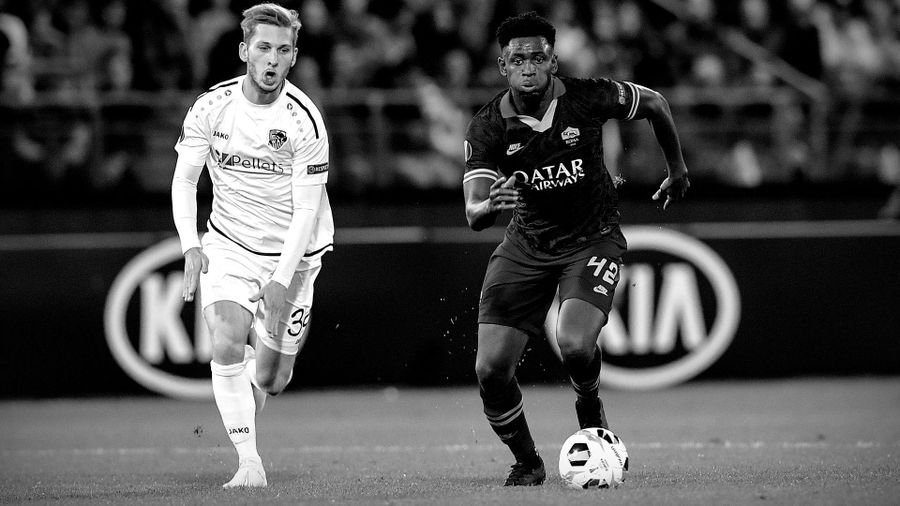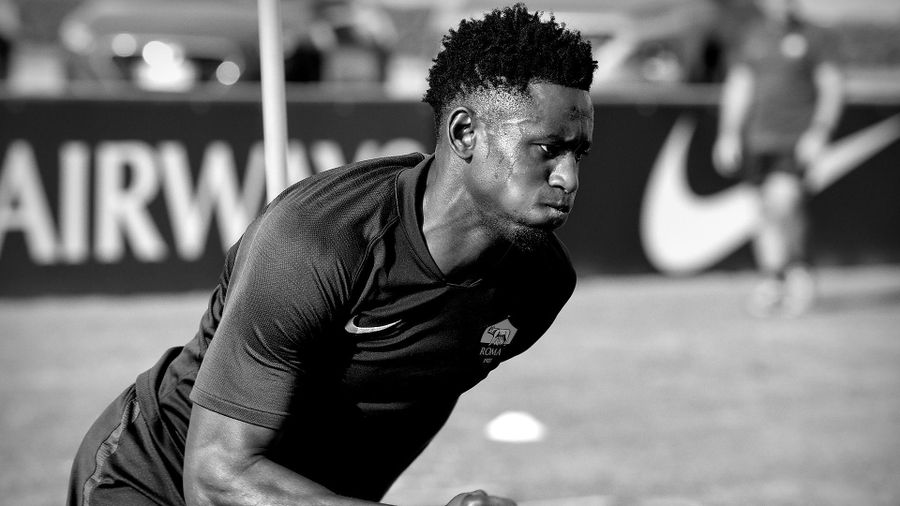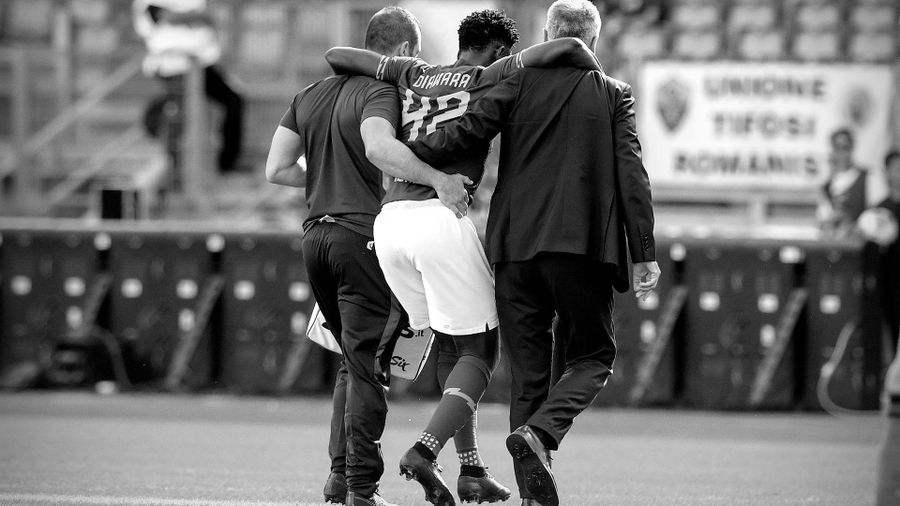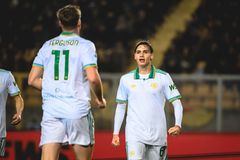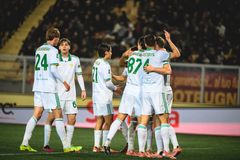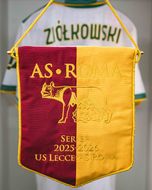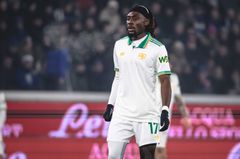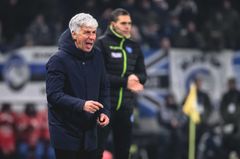
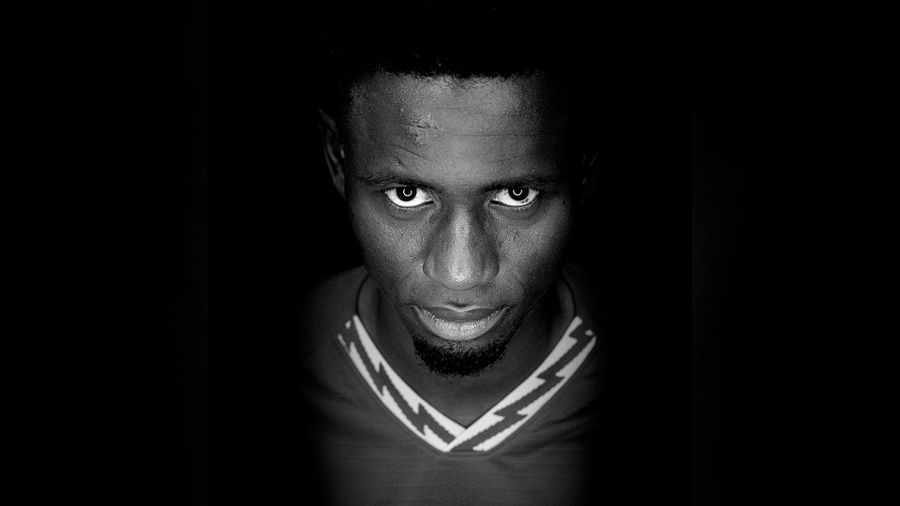
Amadou Diawara's story is one of these incredible tales that football seems to delight in telling.
Having joined Roma last summer, this season Diawara has established himself as a key member of Paulo Fonseca's midfield unit - with his absence due to a knee injury at the start of the year a keenly-felt blow.
But adversity, or at the very least difficulty, is something he has always had to overcome.
From defying his father to make his first steps in the game back in his city in Guinea, to travelling to Italy as a teenager to try and fulfill his potential - here is the midfielder's incredible story to date, in his own words.
What was your childhood like?
"I was born in Conakry, the capital of Guinea. I remember that my father didn't want me to play football when I was little. Every time I played, I had to stop off at a friend's house to have a shower before going home.
"The first time I told him that I wanted to be a footballer, I was given a slap that I can still remember clearly today. My sister Sira helped me by buying football boots for me and hiding them so that my father wouldn't see them because, otherwise, he would've given them to another boy to stop me playing."
Why was he so opposed to you playing football?
"My parents are teachers and my father always said to me that whenever he was going home from work, he'd see heaps of youngsters playing football and two out of all of them at most would be able to make a career out of it. That was why I had to study, as it was seemingly impossible that I would be among the lucky few. I did go to school, but my training schedule interfered with lessons and I'd sometimes skip them to go and play."
What did you think when he told you it was unlikely that you'd fulfil your dream?
"I just thought about football and how much I liked it. I could be one of the lucky few and have always believed that I could go far. The secret was hard work and giving everything for what I wanted to achieve, which is what I did. I challenged my father who didn't have that belief. I did and managed to succeed."
How did he accept the fact that you did become a footballer?
"I put everything into my football. I'd play on the street and on mud pitches for my team. I was producing good performances and scoring goals, so some people started coming to our house to find out more about me and my father saw all of that.
"My sister helped me out by speaking to him to bring him round. He was never fully behind it, but there were too many of us who were in favour and he was the only one against it, so he accepted in the end. He's happy for me now, though!"
Where did you start playing?
"I started on the street in games that we'd organise among ourselves. I then joined a team that was set up by a coach called Alya. He didn't have anything set up, but he was looking for players and we called the team FC Alya. He got us to play in games against other teams like ours.
"When I was 15, a coach from a side in the top flight in Guinea took me on trial with some older players. He was very interested in me, took me on trips and involved me in training. A friend of an agent called Numeku Tounkara saw me and contacted some of his Italian counterparts, which led to my move to Italy."
How tough was it to leave home?
"It wasn't easy to leave one continent for another without knowing the language. I arrived in Italy, where so many other young footballers wanted to embark on the same path as me, so it was certainly a tough challenge. I'm very happy in Italy now. I don't get to go back to Guinea often and do miss it, but my family does come to visit me."
What was your first stop in Italy?
"I went to the Corvino Academy in Lecce and then to San Marino, where I made my debut in Serie C. It was a difficult step to take, initially because of the language, but also the lifestyle. I gradually settled in thanks to my team-mates and felt happy there.
"The main person I took inspiration from in San Marino was centre-back Alessandro Fogacci. He was a top guy and he helped me so much from the moment I arrived, which I'm still grateful to him for now."
You then moved to Bologna...
"I was there for a year and did enjoy it, although it wasn't easy at the start. I moved from the Lega Pro to a Bologna side containing established players, so I had to work very hard to gain coach Delio Rossi's trust. He helped me a lot: he made me plug away on training camps, he made me do double sessions, I'd always stay behind to work with him on my technique, tactics and everything else, because going from the Lega Pro to Serie A is a big leap.
"I really had to earn my place in that team, which I managed to do thanks to the coach, his staff and director Pantaleo Corvino, who tracked my training sessions and gave me advice and belief, making me feel protected.
"I always believed in myself, which is simply essential if you're going to leave Africa and reach Serie A in one year. My former agent, for example, didn't believe I could make the jump, which is why I left him. I now play for a huge club and know that I still have so much more to give."
What are your memories of your Serie A debut?
"It was at the Stadio Olimpico. I came on in the second half of a game between Lazio and Bologna. It was completely different from Serie C, which I'd been playing in until just before then. It was a feeling that I simply can't put into words because it was my childhood dream to get to play in Serie A and be part of the big time."
You then moved to Napoli…
"I think that it was Maurizio Sarri who wanted me at Napoli. I'm grateful to him for that because he really made me improve as a footballer. He taught me how to play the game and selected me in important games straight away, showing how much faith he had in me. We then took different paths, but I'm thankful to him for how much he made me develop as a player and as a man.
"When Carlo Ancelotti took over, I didn't know if I'd stay at Napoli, but he called me to say that I was in his plans. It didn't quite pan out that way in the end. He's a great man, but it didn't work out that well between us."
You're now at Roma, so what's it like working with Paulo Fonseca?
"He's an excellent coach, who's quite similar to Sarri. He always wants us to bring the ball out at our feet and make good use of our midfielders, which is something I very much like. This new adventure is another step forward in my career and I have to make the most of it.
"After the Africa Cup of Nations last summer, I came back before the holidays to meet the coach and my team-mates. I couldn't wait for the season to get going."
How did it feel to take part in the Africa Cup of Nations?
"Playing for Guinea makes me feel something that I can't put into words. It brings a tear to my eye when the fans sing the national anthem. It was my first Africa Cup of Nations and I was so excited to compete in it. It was an incredible experience."
Who was your footballing idol as a child?
"Yaya Toure. I'd watch him on TV at home during his Barcelona days and I also followed his journey with the Ivory Coast. The Africa Cup of Nations is very important to us and we all sit in front of the TV to watch it. He was my idol, so while I watched Guinea's games and got behind my country, I also supported him. He had incredible vision and played in the same position as me. I dreamt of becoming a player like him.
"As for Italian football, I really liked Daniele De Rossi and would watch plenty of Roma matches in order to see him in action. He would simply bowl me over. I loved the way he covered the pitch, his vision and first touch, what a player!"
What's the best piece of advice that you've received for your career?
"The best piece of advice that I've received in my life was from my mother Nagnouma, who is no longer with us. She told me that she was the only person who could give me every single thing that I asked her for and that I'd have to learn to battle much harder to reach my goals without her. That gave me a push in the right direction, including for my career. I knew that I'd have to show twice as much respect to everyone else at all times."
How are you spending the days during this time?
"It's certainly not a good period for anyone. I'm trying to stay relaxed at home in every possible way, which includes following the training programme that the club has given us. I'm just trying to get through it calmly. I've been watching plenty of films and playing FIFA online on the PlayStation against friends and team-mates from the national team."
What do you miss the most from normal life?
"First of all, being out on the pitch, training with the squad and playing in matches. Everything came to a halt just when I was about to make my comeback, so it was frustrating. After being ruled out by injury for some time, I was thrilled to be back with my team-mates and be available for selection once again. I was ready to give my all, but everything had to be stopped, which wasn't ideal."
It was decided that you wouldn't have an operation - instead you worked on your recovery with therapy and careful management. How were the weeks leading up to being ready to return to the pitch?
"I had no doubts about the decision not to be operated on. I had an operation in October when I had a bad knee problem and there was no alternative. This time, however, I was able to take a different path to recovery, without having an operation. I didn't want the operation because it was a key period of the season and I didn't want to leave my team-mates.
"Given that not going under the knife and trying to recover to be back out on the pitch within a reasonable timeframe was an option, that was my preference. I wanted to make my contribution and help us reach our goals by the end of the season."
What sort of shape are you in now?
"I'm doing well and am training every day. We get sent a training programme to follow at home every week and I've been doing so comprehensively. I'm fit."
As a footballer, how does it feel knowing that the whole football world is at a standstill?
"Everything has come to a standstill, in general. Thinking about football right now makes me sad, but we also need to be thinking about others, our health and people's lives. We can save lives and slow the virus down by stopping the league and everything else, and doing things in the right way, such as staying home. It's important to follow the guidance."
Are you in contact with your family?
"Yes and they're all in the same situation as us. The figures are obviously worse in Italy, but all my family members, from my sister in Sweden to the rest in Guinea, are staying at home, doing everything they can to avoid the virus. We all hope that this situation can be resolved as soon as possible."
Check out earlier entries in our Big Interview series:
AS Roma x Jordan Veretout
AS Roma x Elisa Bartoli
AS Roma x Betty Bavagnoli
AS Roma x Chris Smalling
AS Roma x Edin Dzeko
AS Roma x Gianluca Mancini
AS Roma x Aleksandar Kolarov
AS Roma x Nicolo Zaniolo
AS Roma x Jim Pallotta
AS Roma x Cengiz Under
AS Roma x Paulo Fonseca
AS Roma x Leonardo Spinazzola

 Tickets
Tickets
 Shop
Shop














